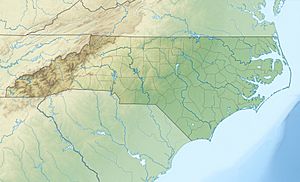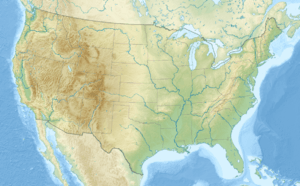Beaver Creek (Fisher River tributary) facts for kids
Quick facts for kids Beaver Creek |
|
|---|---|
|
Location of Beaver Creek mouth
|
|
| Other name(s) | Tributary to Fisher River |
| Country | United States |
| State | North Carolina |
| County | Surry |
| Physical characteristics | |
| Main source | Bull Creek divide about 1 mile northwest of Black Water, North Carolina 1,340 ft (410 m) 36°24′30″N 080°38′00″W / 36.40833°N 80.63333°W |
| River mouth | Fisher River about 2 miles south-southwest of Turkey Ford, North Carolina 938 ft (286 m) 36°21′41″N 080°40′31″W / 36.36139°N 80.67528°W |
| Length | 5.51 mi (8.87 km) |
| Basin features | |
| Progression | southwest |
| River system | Yadkin River |
| Basin size | 5.86 square miles (15.2 km2) |
| Tributaries |
|
| Bridges | Crotts Road, Johnson Road, Turkey Ford Road, Simpson Mill Road |
Beaver Creek is a small stream, about 5.51 miles (8.87 kilometers) long, located in Surry County, North Carolina, in the United States. It's like a smaller river that flows into a bigger one. Beaver Creek is a "tributary" to the Fisher River, which means it feeds water into the Fisher River.
Where Does Beaver Creek Start and End?
Beaver Creek begins its journey about 1 mile (1.6 kilometers) northwest of a place called Black Water, North Carolina. From there, it flows generally towards the southwest. Its journey ends when it joins the Fisher River. This meeting point is about 2 miles (3.2 kilometers) south-southwest of Turkey Ford, North Carolina.
What is a Watershed?
Every stream and river has a "watershed." Think of a watershed as a large area of land where all the rain and snow that falls eventually drains into that specific stream or river. Beaver Creek's watershed covers about 5.86 square miles (15.2 square kilometers). This area gets about 48.2 inches (122 centimeters) of rain and snow each year. About 52% of this land is covered by forests. These forests are important because they help keep the water clean and provide homes for wildlife.
Why Are Small Creeks Important?
Even though Beaver Creek is a small stream, it plays a big role in the environment.
- Water Supply: It contributes to the water flow of the larger Fisher River, which is part of the even bigger Yadkin River system. This water can be used by people and animals.
- Habitats: Small creeks like Beaver Creek provide homes for many different plants and animals. Fish, insects, and other creatures live in and around the water.
- Nature's Filter: The plants and soil in the watershed help filter out pollution from the water before it reaches the creek. This keeps the water cleaner for everyone.
- Connecting Waterways: Creeks are like the veins of a landscape, connecting smaller areas to larger rivers and eventually to the ocean. They are a vital part of the Earth's water cycle.
 | Ernest Everett Just |
 | Mary Jackson |
 | Emmett Chappelle |
 | Marie Maynard Daly |



